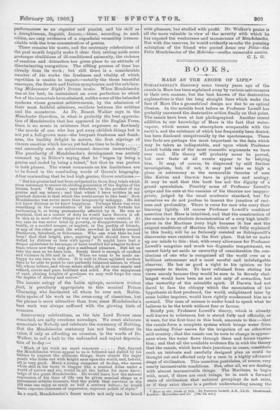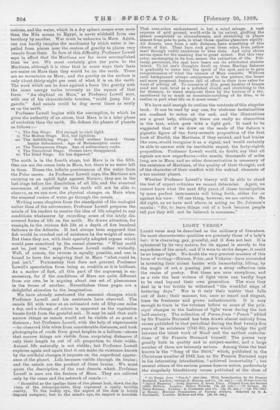BOOKS.
MARS AS THE ABODE OF LIFE.* SCHIAPARELLI'S discovery some twenty years ago of the canals in Mars has been explained away by various astronomers in their own manner, but the best known of the destructive explanations is that the long straight lines which make the face of Mare like a geometrical design are due to an optical illusion. In the notable book before us Professor Lowell has probably answered the destructive critics finally on that point. The canals have been at last photographed. Another recent addition to our knowledge of Mars is the fact that water- vapour, which means an atmosphere comparable with the earth's, and the existence of which has frequently been denied, has been disclosed unequivocally by the spectroscope. These two facts are perhaps the most important in the data which may be taken as indisputable, and upon which Professor Lowell builds one of the most romantic arguments we have ever read. His theory will probably never be proved, but new facts at all events appear to be helping him. It may, of course, be disproved by still further investigation, but, if not, it may yet take as high a place in astronomy as the memorable theories of men like Kelvin and Darwin have in physics and zoology. It may be said that this book has not the dignity of a grand speculation. Possibly some of Professor Lowell's quips and his outs at the enemies of his theories are inappro- priate, judged by the usual academic standard, but for ourselves we do not profess to lament the junction of raci- ness and profundity. There is room for men who carry their 'learning lightly. Of course Professor Lowell's confident assertion that Mars is inhabited, and that the construction of the canals is an absolute demonstration of a very high intelli- gence in the Martians (very high because it has met the exigent conditions of Martian life, which are fully explained in this book), will be as furiously resisted as Schiaparelli's discoveries were resisted in the first place. But let us make up our minds to this : that, with every allowance for Professor Lowell's sanguine and much too dogmatic temperament, we cannot fairly set aside as unworthy of consideration the con- clusions of one who is recognised all the world over as a brilliant astronomer and a most careful and indefatigable observer. He has as good a right to his opinion as his opponents to theirs. To have refrained from stating his views merely because they would he sure to be fiercely chal- lenged would have been an act not only of oowardice, but also unworthy of the scientific spirit. If Darwin had not
dared to face the obloquy which the enunciation of his hypothesis at first produced, the world, enlightened later by some bolder inquirer, would have rightly condemned him as a coward. The man of science is under bond to speak what he believes to be the truth without fear or favour.
Briefly put, Professor Lowell's theory, which is already
well known in substance, but is stated fully and officially, as it were, for the first time in this book, amounts to this :—that the canals form a complete system which brings water from the melting Polar snows for the irrigation of an otherwise arid country ; that the canals can be seen to change iu appear- ance when the water flows through them and forms vegeta- tion; and that all the available evidence fits iu with the theory that the canals, which have their junctions in oases, constitute such an intricate and carefully designed plan as could be thought out and effected only by a race in a highly advanced stage of civilisation. This assertion postulates, of course, very nearly inconceivable conditions. But, after all, we are dealing with almost inconceivable things. The Martians, to begin with, must, if there are such beings, bo in such a forward
state of civilisation that national groupings do not exist, or if they exist there is a perfect understanding among the
Mars as the Abode of Life. By Percival Lowell, &B., LL.D. Illustrated. London ; Macmillan and Co. [10e. 63. net.]
nations, and the water, which in a dry sphere means even more than the Nile means to Egypt, is never withheld from one territory by another. War must.be unknown in Mars. Again, one can hardly imagine the machinery by which water is im- pelled from places near the centres of gravity to places very remote from them. In face of this difficulty, Professor Lowell says in effect that the Martians are far more accomplished than we are. We must certainly give the palm to the Martians, although it is clear that in some ways their feats are easier on Mars than they would be on the earth. There are no mountains on Mars ; and the gravity on the surface is only about thirty-eight per cent. of what it is on the earth. The work which can be done against a force like gravity with the same energy varies inversely as the square of that force. "An elephant on Mars," as Professor Lowell says, with one of his characteristic touches, "could jump like a gazelle." And canals could be dug seven times as easily as on the earth.
Professor Lowell begins with the assumption, to which he gives the authority of an axiom, that Mars is in a later phase of evolution than the earth. He defines the phases of planets as follows :— "1. The Sun Stage. Hot enough to omit light.
n. The Molten Stage. Hot, but lightless. m. The Solidifying Stage. Solid surface formed. Ocean basins determined. Age of Metamorphic rocks. iv. The Terragneous Stage. Age of sedimentary rocks. v. The Terrestrial Stage. Oceans have disappeared.
vi. The Dead Stage. Air has departed."
The earth is in the fourth stage, but Mars is in the fifth. One can see the ocean beds in Mars, but there is no water left in them. Hence the infinite preciousness of the water from the Polar snows. As Professor Lowell says, the Martians are carrying on an uphill fight against Nature; they are in the last stage before the dissolution of all life, and the eventual successors of ourselves on this earth will not be able to observe, as we can now, the physical changes on Mars when the seasonal rushes of water go through the canals.
Writing some chapters from the standpoint of the zoologist rather than of the astronomer, Professor Lowell prepares the minds of his readers to receive the idea of life adapted to any conditions whatsoever by recording some of the lately dis- covered forms of life on the earth. He draws attention, for example, Lathe curious fish life at a depth of five hundred fathoms in the Atlantic. It had always been supposed that fish would be crushed out of existence by the weight of water. But there they are, with their specially adapted organs which would pass unnoticed by. the casual observer. " What could not be, just was," says Professor Lowell rather wickedly. Well, of course, the reverse is equally possible, and one is bound to have the misgiving that in Mars " what could be, just isn't." Fortunately that does not prevent Professor Lowell's speculation from being as credible as it is brilliant.
As a matter of fact, all this part of the argument is un- necessary, for if the ;conditions of Mars are quite different
from our own he is arguing about one set of phenomena in the terms of another. Nevertheless these pages are a -delightful stimulus to the imagination.
We have already mentioned the seasonal changes which Professor Lowell and his assistants have observed. The canals fill with water at an estimated rate of fifty-one miles a day, and a change of colour is apparent as the vegetation bursts forth from the grateful soil. It may be said that such narrow things as canals would not be visible at so great a distance ; but Professor Lowell, with the help of experiments —he observed thin wires from considerable distances, and took photographs of roads from great. heights in a balloon—shows that narrow things are visible from surprising, distances if only their length be out of all . proportion to their 'width. Animal life naturally is not visible; hat Professor, Lowell. -explains again and again that it can make its existence known by the artificial changes it imposes on the •superficial appear- -al:me of the planet. ,Life becomes visible through its. brains ; and the canals are the product of these .brains. We must -quote the, description of the vast . deserts which Professor Lowell is sure are the feature of Mars. They are relieved -only by the oases and the network of canals :— • " Beautiful as the opaline.tints of the planet.look, down the far vista of the telescope-tube, they represent a really. terrible, .reality. To the bodily eye, the aspect of the .disk is lovely, tbeyond compare; but to the mind's eye, its import is horrible.
That rose-ochre enchantment is but a mind mirage. A vast expanse of arid ground, world-wide in its extent, girdling the planet completely in circumference, and stretching in places almost from pole to pole, is what those opaline &amours signify. All deserts, seen from a safe distance, have something of this charm of tint. Their bare rock gives them color, from yellow marl through ruddy sandstone to blue slate. And color shows across space for the massing due to great extent. But this very color, unchanging in its hue, means the extinction of life. Piti- lessly persistent, the opal here bears out its attributed sinister intent. To let one's thoughts dwell on these Martian Saharas is gradually to enter into the spirit of the spot, and so to gain comprehension of what the essence of Mara consists. Without such background always omnipresent in the picture, the lessor and more pregnant features fail of effect in their true value for want of setting off. To conceive of this great buckler of brazen sand and rock, level as a polished shield, and stretching to the far distance, to stand sharp-cut there by the horizon of a sky, unrelieved by so much as mountain-notching of its blue, is to realize in part what life on it must mean."
We have said enough to outline the contents of this singular book. It can be read by any one, for abstruse technicalities are confined to notes at the end, and the illustrations are a great help, although there are really no obscurities in the text, which goes with a light gait. It used to be suggested that if we drew on the sands of the Sahara a gigantic figure of the forty-seventh proposition of the first book of Euclid, the Martians, if they existed, and had brains like ours,.would recognise it as a signal, and would certainly be able to answer with its inevitable sequel, the forty-eighth proposition. Professor Lowell would, no doubt, say that all signals are now superfluous,—the canals, thousands of miles long, are in Mars, and no other demonstration is necessary of the existence of Martians, of the quality of their thought, and of the character of their conflict with the unkind elements of a too ancient planet.
Whether Professor Lowell's theory will be able to stand the test of expert criticism we cannot determine. Again, we cannot know what the next fifty years of closer investigation by more perfect instruments will bring forth, either for or against his view. Of one thing, however, we are certain. He did right, as we have said above, in acting on Dr. Johnson's maxim: "Sir, to leave things out of a book because people tell you they will not be believed is meanness."











































 Previous page
Previous page